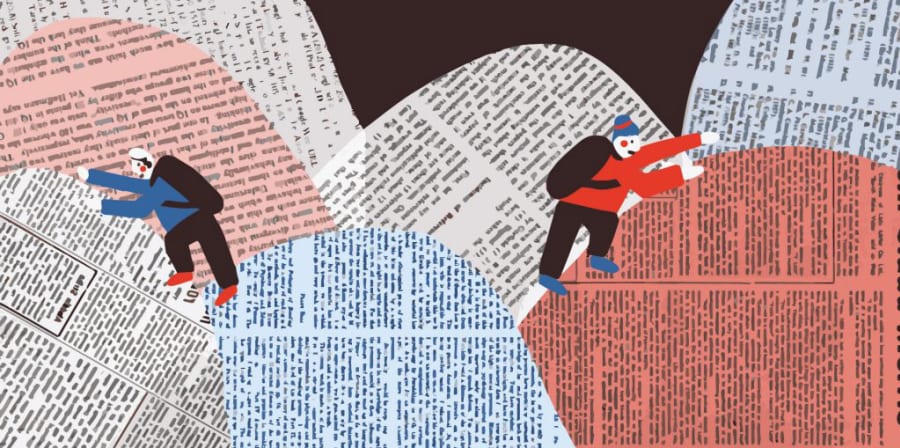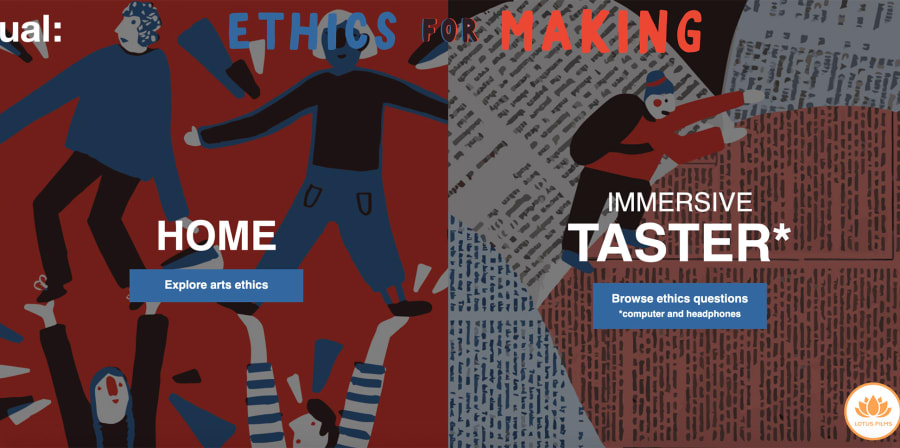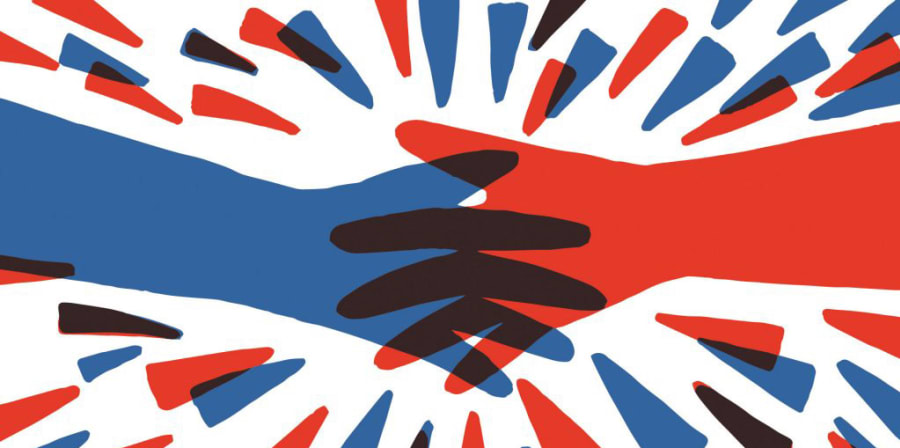The free, digital resource provides a space for students, teachers and makers to explore ethics in creative practice.
Focusing on five key themes of consent, representation, responsibility, freedom and collaboration, Ethics for Making invites audiences to explore ethical considerations through the lens of Professor Pratap Rughani’s documentary film, Justine, which follows a young woman living with severe neurological disorders in the lead-up to a milestone birthday.
Developed using the responses of a range of filmmakers, teachers and students to the film, which has been shown internationally at conferences, film festivals and online teaching sessions, the site has been shaped into 2 distinct areas: the exploratory information resource, 'Home', which offers a range of audio, film and written content; and an 'Immersive Taster', which provides an innovative browsing experience using the specialist software, Klynt. Developed in France, Klynt enables audiences to engage with film through particularly responsive methods.
Complemented by illustrations from UAL student, Gracie Dahl, Ethics for Making was developed by a team at London College of Communication (LCC) which included MA Documentary Film graduate Gareth Johnson, who experimented with Klynt as part of his time on the LCC Graduate Residency, and MA Interaction Design Communication graduate, Virginie Tan, who designed the project paths.
We caught up with Gareth and Virginie to discuss their contributions to the project, the importance of ethics and creativity, and the highlights of their time within the College community.

"Innovative yet accessible experience"
How did you first get involved with Ethics for Making?
Gareth: I joined as part of my work with LCC’s Graduate Residency programme in 2019. I was trialling a new piece of software and looking for a suitable project where it might have some useful applications.
Virginie: I’m an artist and designer who specialises in interaction and media art, and I graduated from LCC in 2017. I was contacted to ask if I’d be interested in taking part, and I’m really grateful I was brought on the project. I liked the theme and the approach, so developed a few proposals before settling into the interactive design part.
What were some of your core roles and responsibilities throughout the project?
Gareth: I was involved in designing the interactive part of the project in Klynt, but it was very much a team effort so I was lucky enough to have some involvement in all parts of the production process.
Virginie: I was in charge of the interactive design and development aspects of overseeing the innovative yet accessible experience of Ethics for Making. I was involved with designing the core paths of the project, 'Home', where I designed and developed the website, and worked closely with Gareth to produce the 'Immersive Taster'.

"Having a resource to turn to and learn from is essential"
Why is Ethics for Making such an important resource for teachers, students and creatives?
Gareth: There aren’t enough things like it out there. I work in commercial video production, and it's sometimes hard to find the time and space to think about questions of ethics. Maybe this project can prompt people to ask some of those questions as part of their process of making.
Virginie: While working on projects, I'm sure many students and professionals will naturally come across questions and worries around the morality and responsibility they hold as a content and sense maker – I sure did. Having a resource they can turn to and learn from is essential. I actually find that the question of ethics isn’t brought to the table enough, despite its importance.
What have been the highlights of your time working on the Ethics for Making project?
Gareth: Really, my highlight has been the fluidity of roles. We all helped each other out on all aspects of the project, and I really enjoyed working with everyone.
Virginie: My highlight has been the contrast between learning a new interactive technology while ensuring accessibility is up to standard. It's very tempting, especially as an interaction designer, to come up with very experimental concepts; however, inclusivity is just as important to enjoy an interactive experience. I've learnt a lot from working on both the project pathways, and I also appreciated the fantastic teamwork that allowed us to come up with this vision!
What have you most enjoyed about working as part of the LCC community?
Gareth: I’ve enjoyed meeting some interesting people who I may not have met otherwise and, of course, making stuff.
Virginie: I enjoy the ways in which research and making are all combined at the College thanks to the amazing facilities, workshops and technicians. I felt I was encouraged to iterate as much as I needed - I wasn't afraid to directly prototype my thoughts and ideas, to fail, and to try again. I was really allowed to experiment with my projects. Also: meeting people! I've made amazing friends from all over the world during my time at LCC – I've learnt so much through and with them.

“A high ethical bar that challenges future filmmakers”
The project has already been received warmly by international scholars including Dr Alexandra Juhasz, Distinguished Professor of Film at Brooklyn College, The City University of New York, who said: “This is an amazing, wonderful, important project…I’m so proud to be a part of it.”
Associate Professor Deirdre Boyle from The New School, New York, also praised the power of Justine itself as a thoughtful and considered film which pays particular care to ethical considerations:
“Cinematically, the film represents Justine with breathtaking delicacy and sets a high ethical bar that challenges future filmmakers to rise to the same level of awareness and respect when documenting the lives of disabled individuals.”
Educational Ethics at UAL
Ethics for Making will also be highlighted as a tool for staff both at and beyond the College through a new internal Canvas resource, Educational Ethics at UAL. With ethical practice central to education across University of the Arts London, this will offer support around integrating this area into the curriculum, ensuring students explore the ethical contexts of learning and making across all levels of study.
Educational Ethics at UAL is supported by the Teaching, Learning and Employability Exchange, which works in partnership with staff and students to enhance teaching, learning and careers education across the University through access to courses, workshops and resources.

“The power of documentary film to illuminate ethics in creative practice”
Director of Lotus Films and Associate Dean of Research at London College of Communication, Professor Pratap Rughani, highlighted the importance of developing Ethics for Making through an open and collaborative approach.
"The whole team helped develop new thinking in the ethics of making art, media, and design work,” he said.
“Responding to audiences' questions inspired us to develop a learning tool that put the underpinning ethical choices of our work into a strong light. By making visible some difficult ethical questions, we aim to help students and others put practice ethics at the centre of their work."
Iris Wakulenko, Project and Digital Producer on Ethics for Making and Associate Lecturer on MA Documentary Film at LCC, further emphasised the strength of utilising the skills of collective practitioners throughout the development of the project.
“Having initially worked on Justine as sound recordist, it's been a unique opportunity as Project and Digital Producer to help realise the power of documentary film to illuminate ethics in creative practice,” she said.
“Ethics for Making is the result not only of the many contributors who shared their responses with us, but of the expertise of staff, students and alumni of LCC and UAL. In particular, it's been really rewarding to work with our MA graduates.”
Related links
- Explore Ethics for Making and the work of Lotus Films.
- Find out more about the Research Office at London College of Communication.
- Learn more about our MA Documentary Film and MA Interactive Design Communication courses.

